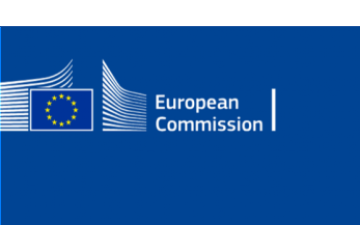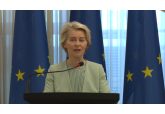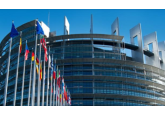
The EU will mobilize 2.5 billion euros in new investments from international financial institutions and the private sector at the expense of Moldova's Reform and Growth Fund
This is stated in the materials of the European Commission, released in connection with the adoption by the European Commission of the Economic Growth Plan for Moldova worth 1.8 billion euros, backed by the Reforms and Growth Fund for 2025-2027. This plan, which is the largest EU financial assistance package since Moldova's independence, will contribute to the growth of Moldova's economy, bringing the country closer to EU membership by accelerating reforms. As noted, given the country's path to EU membership, the Moldova's Reform and Growth Fund aims at providing more financial assistance and implementing a comprehensive reform program. The investments will help Moldova realize its full potential in terms of sustainable economic and social development in comparison with EU countries, improving living standards and accelerating Moldova's accession to the EU. The Fund, presented separately as a legislative proposal to the European Parliament and the Council, would provide up to 1.8 billion euros in assistance and would be very similar to the Reform and Growth Fund for the Western Balkans. It would be financed by a bilateral allocation of 420 million euros foreseen for Moldova under the Neighborhood, Development and International Cooperation Instrument - Global Europe (NDICI) and would cover 2025-2027. Part of this amount will be used to mobilize loans directly to Moldova's national budget to accelerate the reforms foreseen in the reform program and to ensure the necessary investments. As noted, these loans will be very concessional, with a long repayment period and favorable interest rates. Irrevocable financial assistance will continue to be provided in a bilateral format, including technical assistance to accompany the implementation of the Economic Growth Plan priorities and support to civil society. Moldova will continue to participate in regional initiatives, as well as in EU programs. The disbursements within the fund will depend on the implementation of specific reforms and investments, as defined in the Reform Program. The European Commission also points out that Moldova's Reform and Growth Fund is expected to mobilize about 2.5 billion euros in new investments from international financial institutions and the private sector. This substantial increase in public and private investment will go hand in hand with the implementation of the Reform Program, designed to provide the energy, transport and digital communications infrastructure necessary for business and trade to thrive. The Fund will also attract investments to accompany Moldova on its path to decarbonization. The Neighborhood Investment Platform (NIP) will be the main vehicle for implementing these investments. It will build on the work already done under the Economic and Investment Plan (EIP) for Moldova, which has led investments in critical sectors such as communications, energy efficiency, business development, and competitiveness. The Economic Growth Plan, which focuses on the Reform Agenda and aligned investments, will serve as a solid strategic framework and can support Moldova's donor coordination efforts, particularly in the context of Moldova's Partnership Platform, which brings together EU Member States, G7 countries, international and like-minded partners. The EC contribution states that Moldova is on the path to EU accession, but in light of the consequences of Russia's war of aggression against Ukraine and Russia's hybrid war against Moldova, it continues to face serious challenges in restarting economic growth and advancing reforms and socio-economic development at an adequate pace. Following the Economic Growth Plan for the Western Balkans, the Moldova Economic Growth Plan is a timely extension of the EU's offer to help Moldova improve prospects for sustainable economic development and accelerate the fundamental reforms needed to narrow the economic convergence gap. Through three interrelated pillars, the Plan will support Moldova's integration into the EU and its single market. It aims to overcome structural challenges, promote fundamental reforms in the rule of law and the fight against corruption and organized crime. The Plan will close important investment gaps in infrastructure and business, promote the transition to green technologies and digitalization, and increase productivity by focusing on key sectors with high growth potential. Ultimately, it will enable Moldova's economy to potentially double over the next decade and attract new capital investment. It will help create 5,000 new businesses and help 100,000 Moldovan citizens find jobs. To fully benefit from the Economic Growth Plan, Moldova must implement reforms and ensure a comprehensive approach that includes all sectors of society. This, in turn, should lead to faster harmonization with EU laws and standards, as well as reforms in fundamental areas of the enlargement process. Effective implementation will require a robust mechanism with strong inter-institutional coordination within the country. The Economic Growth Plan for Moldova will serve as a strategic roadmap for investments over the coming years and provide a platform to improve donor coordination or to ensure broad and targeted support for needed reforms and investments. By promoting a strong and sustainable economy, the Economic Growth Plan for Moldova will bring tangible benefits to all citizens and lay the foundation for a sustainable, prosperous and peaceful future for Moldova, reflecting its aspirations to accelerate its integration with the EU. EU High Representative for Foreign Affairs and Security Policy Josep Borrell said that the new Economic Growth Plan for Moldova is another example of the EU's support in ensuring the country's security, peace and prosperity. It will strengthen Moldova's economy and create opportunities for all Moldovan citizens. “The Plan is a recognition of the impressive results Moldova has already achieved on its path to the EU. It will facilitate further progress on fundamental and socio-economic reforms. Moldova's future is in the European Union,” he said. For his part, European Commissioner for Neighborhood and Enlargement Olivér Várhelyi said that the EU fulfills its promise to help Moldova in the process of socio-economic convergence and EU accession. “The financial support under the Economic Growth Plan for Moldova is strategically aligned with the country's priorities and needs. This ensures that investments are directed where they will bring the greatest benefit to Moldova, its people and businesses,” he emphasized. // 10.10.2024 - InfoMarket.







